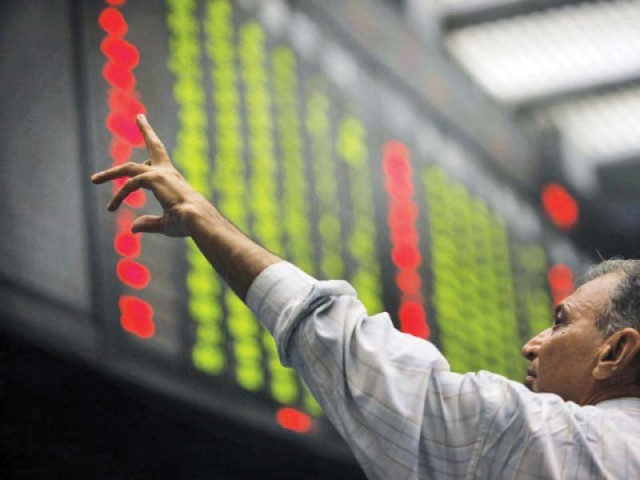With Hijazi’s whip gone, the bull is on the go at Pakistan’s stock market
SECP has seemingly adopted a more lenient approach to regulations

Leniency in regulations is also seen in the backdrop of influence being exerted by the
strategic investor - the Chinese consortium - that controls 40% stake in the PSX, said an official. PHOTO: FILE
But the bullish trend is only recent.
After being Asia’s best in 2016, the KSE-100 went on to become the world’s worst the very next year. This came during the time the Pakistan Stock Exchange (PSX) was actually upgraded to MSCI’s Emerging Markets Index.
Near the end of December, all that changed.
There was political calm, and it seemed more likely that the government would complete its tenure, albeit on a spare wheel.
Attractive valuations brought back foreigners as the rupee depreciated, and fund managers decided to pump their cash. Sales pitches for mutual funds got louder as recovery started, and brokerage houses saw a surge in volume.
Uncertainty has wiped $18.5b off Pakistan's stock market
One huge reason for bull run
Many argue the recovery is due to clarity on the political front. Some say rupee depreciation made the road clearer.
What most do not mention is the role of the Securities and Exchange Commission of Pakistan (SECP); more specifically, its acting chairman Zafar Abdullah.
Abdullah replaced Zafar Hijazi who was arrested after a special court of the Federal Investigation Agency (FIA) indicted him for tampering with records related to the Sharif family’s Chaudhry Sugar Mills.
In the six months since Hijazi left, there has been a clear stance of the SECP - undo regulations introduced during his tenure, and ensure market players are well-fed and happy in a bid to push back the KSE-100 to its previous high levels.
While Hijazi’s laws were labelled strict by market players, his own point of view was ensuring investors are protected amid brokers’ defaults.
Regardless, capital market brokers, who remain the single largest driving force behind the market, have widely welcomed softening of the regulations. They say the new changes are helping revive trading activity and making more financing available to investors.
However, a PSX official, who remained deeply involved with both SECP men, said neither were original regulations framed with consultation of stakeholders, nor are the current abrupt changes being made after consultation.
“The former chairman (Hijazi) did all what he thought was right and the same is being done by the current acting chairman (Abdullah),” he said.
U-turn of regulations
The SECP has recently withdrawn a regulation that required mutual funds (equity funds and funds of funds) to maintain at least 5% of their assets under management in cash or near cash instruments to timely meet redemption calls from unit holders. Now, the fund managers are allowed to invest 100% cash.
Foreign national heads Pakistan's stock market for first time
The apex regulator has also softened rules for securities’ financing to investors by banks and brokerage houses. A lenient leverage product called Badla made a meaningful contribution in the 2008 crash at the PSX (formerly known as the KSE).
The SECP has also reversed rules to allow increased representation of shareholders on the PSX board of directors after reducing the number of independent directors whose job is to eliminate favouritism. It has allowed foreigners to extend their positions in the PSX - the company - which was previously barred.
Several other regulations have been undone to put the PSX back on its growth run.
As a result, the KSE-100 Index has recovered close to 15% in the last one month.
“Hijazi’s management overdid the regulations,” a former director on the PSX board and a broker Zafar Moti told The Express Tribune.
“The change of rules (by Abdullah) is widely welcomed. He has been a securities broker,” he said.
Leniency in regulations is also seen in the backdrop of influence being exerted by the strategic investor - the Chinese consortium - that controls 40% stake in the PSX, he said.
“The market would have dropped further below 38,000 points had the SECP not done away with over-regulations,” he said.
Meanwhile, the PSX official said the SECP should have constituted a committee to frame rules for the capital market. “The committee would have held meaningful consultations with stakeholders, debated and recommended regulations, which did not happen at all.
“Rules were made by individuals on the recommendation of a few brokers and being implemented through directives. Regulations should only be proposed by the PSX,” he said.
In response, SECP spokesman Sajid Gondal said the current initiatives have been taken after giving due consideration to the prevailing risk management measures. “None of these measures have impaired the risk management already in place in any manner.”
However, an analyst who did not want to be named said softer regulations may push the KSE-100 up, but increases the risk factor if the bull run is not backed by fundamentals. “The market was oversold at one point,” conceded the analyst. “But if too much leeway is given to brokers, then there is always a risk of brokers’ default.
Small-time investors tend to lose out in these situations. As long as the SECP can tighten the noose around defaulting brokers and ensure investors’ rights, there should be no issue.”
Published in The Express Tribune, January 19th, 2018.
Like Business on Facebook, follow @TribuneBiz on Twitter to stay informed and join in the conversation.


















COMMENTS
Comments are moderated and generally will be posted if they are on-topic and not abusive.
For more information, please see our Comments FAQ